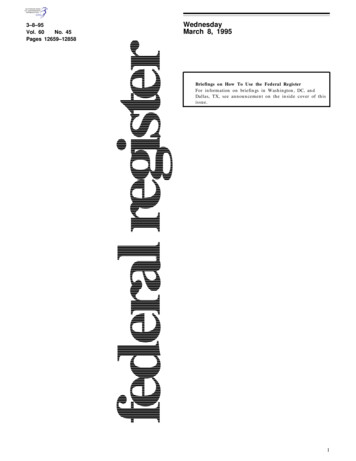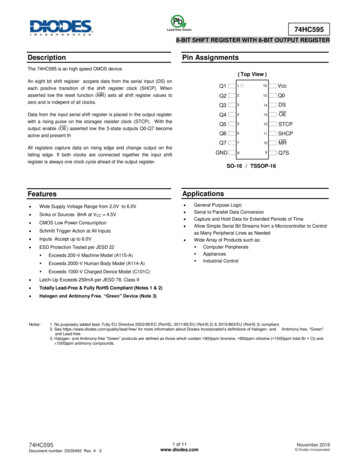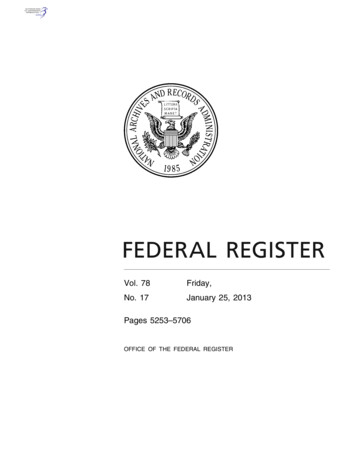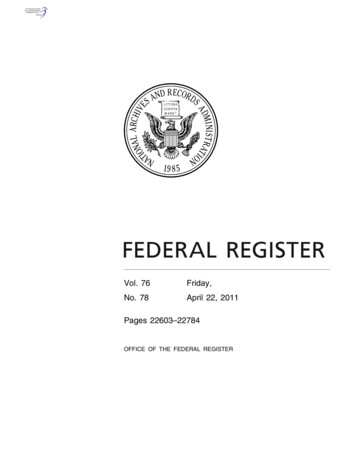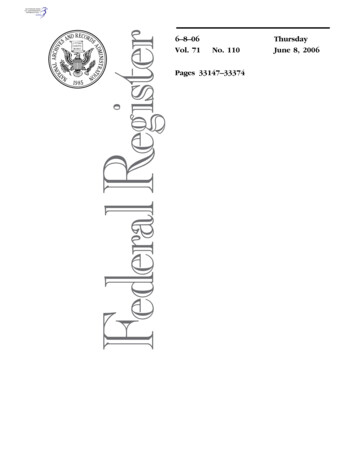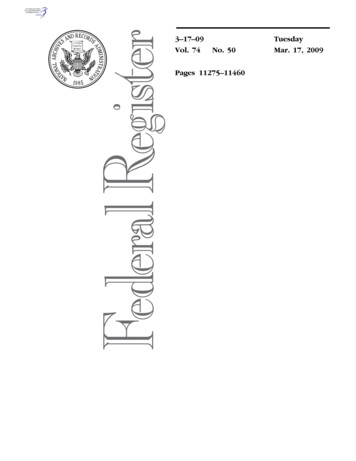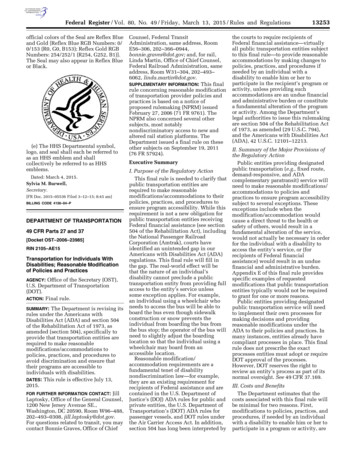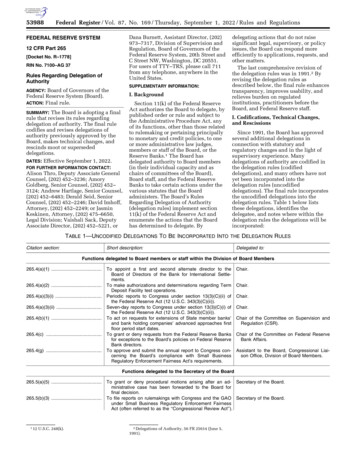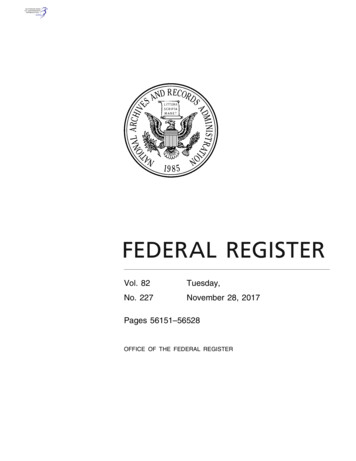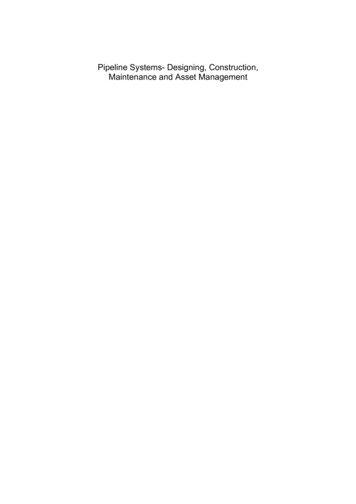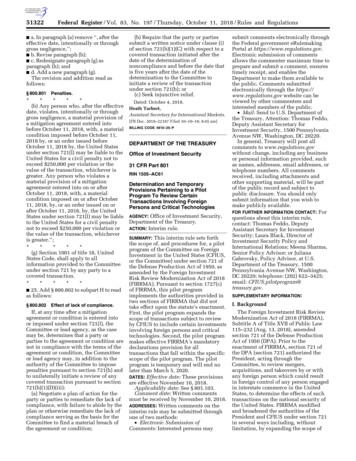
Transcription
51322Federal Register / Vol. 83, No. 197 / Thursday, October 11, 2018 / Rules and Regulationsa. In paragraph (a) remove ‘‘, after theeffective date, intentionally or throughgross negligence,’’; b. Revise paragraph (b); c. Redesignate paragraph (g) asparagraph (h); and d. Add a new paragraph (g).The revision and addition read asfollows: § 800.801Penalties.*****(b) Any person who, after the effectivedate, violates, intentionally or throughgross negligence, a material provision ofa mitigation agreement entered intobefore October 11, 2018, with, a materialcondition imposed before October 11,2018 by, or an order issued beforeOctober 11, 2018 by, the United Statesunder section 721(l) may be liable to theUnited States for a civil penalty not toexceed 250,000 per violation or thevalue of the transaction, whichever isgreater. Any person who violates amaterial provision of a mitigationagreement entered into on or afterOctober 11, 2018, with, a materialcondition imposed on or after October11, 2018, by, or an order issued on orafter October 11, 2018, by, the UnitedStates under section 721(l) may be liableto the United States for a civil penaltynot to exceed 250,000 per violation orthe value of the transaction, whicheveris greater.’’;*****(g) Section 1001 of title 18, UnitedStates Code, shall apply to allinformation provided to the Committeeunder section 721 by any party to acovered transaction.***** 25. Add § 800.802 to subpart H to readas follows:khammond on DSK30JT082PROD with RULES§ 800.802Effect of lack of compliance.If, at any time after a mitigationagreement or condition is entered intoor imposed under section 721(l), theCommittee or lead agency, as the casemay be, determines that a party orparties to the agreement or condition arenot in compliance with the terms of theagreement or condition, the Committeeor lead agency may, in addition to theauthority of the Committee to imposepenalties pursuant to section 721(h) andto unilaterally initiate a review of anycovered transaction pursuant to section721(b)(1)(D)(iii):(a) Negotiate a plan of action for theparty or parties to remediate the lack ofcompliance, with failure to abide by theplan or otherwise remediate the lack ofcompliance serving as the basis for theCommittee to find a material breach ofthe agreement or condition;VerDate Sep 11 201419:54 Oct 10, 2018Jkt 247001(b) Require that the party or partiessubmit a written notice under clause (i)of section 721(b)(1)(C) with respect to acovered transaction initiated after thedate of the determination ofnoncompliance and before the date thatis five years after the date of thedetermination to the Committee toinitiate a review of the transactionunder section 721(b); or(c) Seek injunctive relief.Dated: October 4, 2018.Heath Tarbert,Assistant Secretary for International Markets.[FR Doc. 2018–22187 Filed 10–10–18; 8:45 am]BILLING CODE 4810–25–PDEPARTMENT OF THE TREASURYOffice of Investment Security31 CFR Part 801RIN 1505–AC61Determination and TemporaryProvisions Pertaining to a PilotProgram To Review CertainTransactions Involving ForeignPersons and Critical TechnologiesOffice of Investment Security,Department of the Treasury.ACTION: Interim rule.AGENCY:This interim rule sets forththe scope of, and procedures for, a pilotprogram of the Committee on ForeignInvestment in the United States (CFIUS,or the Committee) under section 721 ofthe Defense Production Act of 1950, asamended by the Foreign InvestmentRisk Review Modernization Act of 2018(FIRRMA). Pursuant to section 1727(c)of FIRRMA, this pilot programimplements the authorities provided intwo sections of FIRRMA that did nottake effect upon the statute’s enactment.First, the pilot program expands thescope of transactions subject to reviewby CFIUS to include certain investmentsinvolving foreign persons and criticaltechnologies. Second, the pilot programmakes effective FIRRMA’s mandatorydeclarations provision for alltransactions that fall within the specificscope of the pilot program. The pilotprogram is temporary and will end nolater than March 5, 2020.DATES: Effective date: These provisionsare effective November 10, 2018.Applicability date: See § 801.103.Comment date: Written commentsmust be received by November 10, 2018.ADDRESSES: Written comments on theinterim rule may be submitted throughone of two methods: Electronic Submission ofComments: Interested persons maySUMMARY:PO 00000Frm 00022Fmt 4700Sfmt 4700submit comments electronically throughthe Federal government eRulemakingPortal at https://www.regulations.gov.Electronic submission of commentsallows the commenter maximum time toprepare and submit a comment, ensurestimely receipt, and enables theDepartment to make them available tothe public. Comments submittedelectronically through the https://www.regulations.gov website can beviewed by other commenters andinterested members of the public. Mail: Send to U.S. Department ofthe Treasury, Attention: Thomas Feddo,Deputy Assistant Secretary forInvestment Security, 1500 PennsylvaniaAvenue NW, Washington, DC 20220.In general, Treasury will post allcomments to www.regulations.govwithout change, including any businessor personal information provided, suchas names, addresses, email addresses, ortelephone numbers. All commentsreceived, including attachments andother supporting material, will be partof the public record and subject topublic disclosure. You should onlysubmit information that you wish tomake publicly available.FOR FURTHER INFORMATION CONTACT: Forquestions about this interim rule,contact: Thomas Feddo, DeputyAssistant Secretary for InvestmentSecurity; Laura Black, Director ofInvestment Security Policy andInternational Relations; Meena Sharma,Senior Policy Advisor; or JulianaGabrovsky, Policy Advisor, at U.S.Department of the Treasury, 1500Pennsylvania Avenue NW, Washington,DC 20220; telephone: (202) 622–3425;email: CFIUS.pilotprogram@treasury.gov.SUPPLEMENTARY INFORMATION:I. BackgroundThe Foreign Investment Risk ReviewModernization Act of 2018 (FIRRMA),Subtitle A of Title XVII of Public Law115–232 (Aug. 13, 2018), amendedsection 721 of the Defense ProductionAct of 1950 (DPA). Prior to theenactment of FIRRMA, section 721 ofthe DPA (section 721) authorized thePresident, acting through theCommittee, to review mergers,acquisitions, and takeovers by or withany foreign person which could resultin foreign control of any person engagedin interstate commerce in the UnitedStates, to determine the effects of suchtransactions on the national security ofthe United States. FIRRMA modifiedand broadened the authorities of thePresident and CFIUS under section 721in several ways including, withoutlimitation, by expanding the scope ofE:\FR\FM\11OCR1.SGM11OCR1
Federal Register / Vol. 83, No. 197 / Thursday, October 11, 2018 / Rules and Regulationskhammond on DSK30JT082PROD with RULESforeign investments in the United Statessubject to national security reviewpursuant to section 721.Section 1727(a) of FIRRMA madecertain provisions of FIRRMA effectiveimmediately upon enactment on August13, 2018. Section 1727(b) of FIRRMA,however, delayed the effectiveness ofany provision of FIRRMA not specifiedin section 1727(a) until the earlier of: (1)The date that is 18 months after the dateof enactment of FIRRMA (i.e., February13, 2020); or (2) the date that is 30 daysafter publication in the Federal Registerof a determination by the chairperson ofCFIUS that the regulations,organizational structure, personnel, andother resources necessary to administerthe new provisions are in place.Notwithstanding section 1727(b),section 1727(c) of FIRRMA authorizesCFIUS to conduct one or more pilotprograms to implement any authorityprovided pursuant to any provision of,or amendment made by, FIRRMA thatdid not take effect immediately uponenactment. Section 1727(c) states that apilot program may not commence untilthe date that is 30 days after publicationin the Federal Register of adetermination by the chairperson ofCFIUS of the scope of, and proceduresfor, the pilot program. This documentand the interim rule set forth hereinconstitute the required determination ofthe scope of, and procedures for, aCFIUS pilot program relating to criticaltechnologies pursuant to section1727(c)(2) of FIRRMA.II. Waiver of Public CommentRequirement for Temporary ProvisionsThe interim rule set forth in thisdocument implements a pilot program,pursuant to section 721, relating toforeign investment into certain U.S.businesses that produce, design, test,manufacture, fabricate, or develop oneor more critical technologies. Section709(a) of the DPA (50 U.S.C. 4559(a))provides that regulations issued underthe DPA are not subject to therulemaking requirements of theAdministrative Procedure Act (APA).Moreover, to the extent that therulemaking requirements of the APAwere determined to apply to this interimrule, the provisions of the APArequiring notice of proposedrulemaking, opportunity for publicparticipation, and delay in effective date(5 U.S.C. 553), as well as the provisionsof Executive Order 13771, areinapplicable because this interim ruleinvolves a foreign affairs function of theUnited States. By its terms, the pilotprogram to be implemented pursuant tothis interim rule regulates the conductof foreign persons seeking to acquireVerDate Sep 11 201419:54 Oct 10, 2018Jkt 247001certain interests in particular U.S.businesses, precisely because theacquisition of such interests could harmthe strategic national security interestsof the United States vis-à-vis othernations.Notwithstanding that the rulemakingrequirements of the APA do not applyto this interim rule, Section 709(b)(1) ofthe DPA provides that, except asotherwise provided in section 709, anyregulation issued under the DPA mustbe published in the Federal Registerand opportunity for public commentmust be provided for not less than 30days, consistent with the requirementsof 5 U.S.C. 553(b).Section 709(b)(2) of the DPA (50U.S.C. 4559(b)(2)), however, providesthat the requirements of section709(b)(1) may be waived if: (1) Theofficer authorized to issue the regulationfinds that urgent and compellingcircumstances make compliance withsuch requirements impracticable; (2) theregulation is issued on a temporarybasis 1; and (3) the publication of suchtemporary regulation is accompanied bythe finding made under (1) (and a briefstatement of the reasons for suchfinding) and an opportunity for publiccomment is provided for not less than30 days before any regulation becomesfinal.The regulations set forth in thisdocument meet the three requirementsof section 709(b)(2) of the DPA for thereasons below, and therefore qualify forwaiver of the public commentrequirement of section 709(b)(1) of theDPA.First, as required by section709(b)(2)(A) of the DPA, and for thereasons described in part III, below, theSecretary of the Treasury finds, and theCommittee agrees, that urgent andcompelling circumstances makecompletion of the process for publicparticipation in rulemaking set forth insection 709 of the DPA impracticableprior to the effectiveness of this interimrule.Second, pursuant to section 1727(c)(1)of FIRRMA, the authority for a pilotprogram is time limited to no more than570 days following the date ofFIRRMA’s enactment, making anyFIRRMA pilot program inherentlytemporary. Consistent with thatlimitation and the requirement ofsection 709(b)(2)(B) of the DPA, theseregulations are issued on a temporarybasis. Section 801.101 sets forth theduration of the pilot programregulations.1 Temporary regulations with no specificexpiration date are ‘‘interim rules’’ for purposes ofFederal Register classification.PO 00000Frm 00023Fmt 4700Sfmt 470051323Third, consistent with therequirement of section 709(b)(2)(C) ofthe DPA, if the Committee intends tomake the provisions of this interim rulefinal, CFIUS will complete the processfor public participation in rulemakingset forth in section 709 of the DPA inconjunction with the issuance of a finalrule.Given the pilot program’s scope andobjectives, considering and respondingto public comments prior to theeffectiveness of this interim rule wouldbe inconsistent with U.S. foreign affairsinterests because it would delay theeffective date of the pilot program,which could provide threat actors withtime to harm U.S. national security byquickly acquiring U.S. criticaltechnologies, contrary to the urgent andcompelling circumstances justifying thisprogram, as discussed below.As a result, the Committee isproviding an immediate opportunity forpublic comment on this interim ruleand will consider and address suchcomments in the process ofpromulgating any final rule, consistentwith section 709(b)(3) of the DPA. Thisapproach appropriately balances theurgency of the pilot program with theneed for public participation in theformulation of any final rule.III. Urgent and CompellingCircumstances for the Pilot ProgramThe passage of FIRRMA was basedupon concerns that, as noted at section1702(b)(4) of FIRRMA, ‘‘the nationalsecurity landscape has shifted in recentyears, and so has the nature of theinvestments that pose the greatestpotential risk to national security. . . .’’FIRRMA provides CFIUS time todevelop the resources and regulationsnecessary to administer all of FIRRMA’sprovisions before the statute becomesfully effective. Notwithstanding this,FIRRMA also provides the authority forpilot programs and, in doing so,recognizes the need to immediatelyassess and address significant risks tonational security posed by some foreigninvestments.In order to be effective in identifyingand addressing these national securityrisks, FIRRMA recognizes that theremay be circumstances in which theCommittee deems it appropriate torequire mandatory declarations forspecific types of transactions. This pilotprogram establishes mandatorydeclarations for certain transactionsinvolving investments by foreignpersons in certain U.S. businesses thatproduce, design, test, manufacture,fabricate, or develop one or more criticaltechnologies. The purpose of the pilotprogram is to assess and addressE:\FR\FM\11OCR1.SGM11OCR1
khammond on DSK30JT082PROD with RULES51324Federal Register / Vol. 83, No. 197 / Thursday, October 11, 2018 / Rules and Regulationsongoing risks to the national security ofthe United States resulting from twourgent and compelling circumstances:(1) The ability and willingness of someforeign parties to obtain equity interestsin U.S. businesses in order to affectcertain decisions regarding, or to obtaincertain information relating to, criticaltechnologies; and (2) the rapid pace oftechnological change in certain U.S.industries. The Committee hasdeveloped this pilot program withoutexempting any country from themandatory declaration requirement inorder to understand and examine, in acomprehensive manner, the nature offoreign direct investment as it relates tocritical technologies and the pilotprogram industries. Further, foreigninvestors that may present nationalsecurity concerns are becomingincreasingly sophisticated in structuringinvestments in a manner that mayobfuscate those concerns, including byutilizing entities in other jurisdictions.As a result, CFIUS is implementing thispilot program on a global basis. Thepilot program will inform the fullimplementation of FIRRMA, includingthe Committee’s approach with respectto the country specification provision inFIRRMA.Technological superiority has longunderpinned the United States’ militarystrategy and national securityinnovation base. The Administrationsupports protecting our nationalsecurity from emerging risks whilemaintaining an open investment policy.Although the vast majority of foreigndirect investment in the United Statesprovides economic benefits to ournation—including the promotion ofeconomic growth, productivity,competitiveness, and job creation—some foreign direct investmentthreatens to undermine thetechnological superiority that is criticalto U.S. national security. Specifically,the threat to critical technologyindustries is more significant than everas some foreign parties seek, throughvarious means, to acquire sensitivetechnologies with relevance for U.S.national security. Foreign investment inU.S. critical technologies has grownsignificantly in the past decade, and anenhanced framework is needed toaddress the potential impacts of thisgrowth on U.S. national security.Prior to FIRRMA, CFIUS’s authoritiesdid not sufficiently address the new andemerging risks that foreign directinvestment can pose to U.S.technological superiority. For example,foreign investors do not need to acquirea controlling interest in order to affectcertain decisions made by, or obtaincertain information from, a U.S.VerDate Sep 11 201419:54 Oct 10, 2018Jkt 247001business with respect to the use,development, acquisition, or release ofcritical technology. CFIUS’s authorities,however, only applied to transactionsthat could result in foreign control of aU.S. business. Consequently, CFIUS hadno authority to prevent a foreign entityfrom acquiring a non-controllinginterest in a U.S. business thatproduces, designs, tests, manufactures,fabricates, or develops one or morecritical technologies. FIRRMA providesCFIUS new authorities to address thenational security concerns that mayarise from these investments, but thoseauthorities were not immediatelyeffective upon FIRRMA’s enactment.Together, the pace of technologicalchange in certain critical technologyindustries, the significant growth inforeign investment in certain industriesrelevant to national security, and thecurrent inability of CFIUS to examinecertain non-controlling transactionscreates urgent and compellingcircumstances for the pilot program thatmake completion of the process forpublic participation in rulemaking setforth in section 709 of the DPAimpracticable prior to the effectivenessof this interim rule. Implementing thepilot program expeditiously is necessaryboth to protect critical technologies andto evaluate how best to implementcertain aspects of FIRRMA in the longterm. The temporary nature of the pilotprogram and the short timeframe withinwhich to gather data to help inform thefull implementation of FIRRMA compela rapid implementation of this interimrule. Delaying effectiveness of theinterim rule would create anunacceptable risk of erosion of U.S.technological superiority. Withoutimmediate action, foreign parties will beable to influence the use of, anddecisions made by U.S. businesses withrespect to, critical technologies throughthe types of investments FIRRMA isintended to address. The list of pilotprogram industries identified in AnnexA has been carefully developed by theU.S. government to narrowly scope thepilot program to include only thoseindustries in which the threat of erosionof technological superiority from someforeign direct investment requiresimmediate action. As noted above, theCommittee invites comments on thisinterim rule, will consider anycomments received, and if theCommittee intends to make theprovisions of this interim rule final, willinclude in any final rule responses tosuch comments.Notwithstanding the issuance of thisinterim rule, the regulations at part 800remain in effect.PO 00000Frm 00024Fmt 4700Sfmt 4700IV. Discussion of the Pilot ProgramInterim RuleSubpart-by-Subpart Overview of thePilot Program Interim RuleThe interim rule builds upon existingrules governing CFIUS’s review oftransactions for national securityconsiderations and adds a pilot programwith two purposes. First, the pilotprogram expands the scope oftransactions subject to review by CFIUSto include transactions subject to aportion of FIRRMA’s ‘‘otherinvestments’’ provision. Second, thepilot program makes effective FIRRMA’smandatory declarations provision fortransactions that fall within the specificscope of the pilot program. The scope,procedures, and terms used in the pilotprogram are specific to the pilotprogram and subject to change in theproposed final rule implementingFIRRMA. The following discussionprovides an overview of each subpart ofthe interim rule.Subpart ASubpart A sets forth the scope of thepilot program, its applicability based onthe timing of certain events relating toa transaction, and the effect of the pilotprogram on other laws. FIRRMAauthorizes the Committee to conductone or more pilot programs toimplement any authority providedpursuant to any provision of, oramendment made by, FIRRMA that didnot take effect on the date of itsenactment. This pilot program expandsthe scope of transactions subject toreview by CFIUS to include certaininvestments by foreign persons incertain U.S. businesses that produce,design, test, manufacture, fabricate, ordevelop one or more criticaltechnologies. The pilot program alsorequires the submission of declarationswith basic information regarding certaincovered transactions, unless the partieselect to file a notice instead. Thepurpose of implementing a pilotprogram addressing these areas is toconfront the rapid changes in certaincritical technology industries, thesignificant growth of certain types offoreign investment in those industries,and the current inability of CFIUS toreview non-controlling transactions,which creates an unacceptable risk ofundermining U.S. technologicalsuperiority in industries with nationalsecurity implications. The regulations inthis interim rule supplement existingregulations implementing section 721 ofthe DPA, which remain in effect.Consistent with section 1727(c)(1) ofFIRRMA, the pilot programimplemented through these regulationsE:\FR\FM\11OCR1.SGM11OCR1
Federal Register / Vol. 83, No. 197 / Thursday, October 11, 2018 / Rules and Regulationskhammond on DSK30JT082PROD with RULESwill end no later than March 5, 2020,the date that is 570 days after theenactment of FIRRMA. Theseregulations will be amended, replaced,or removed no later than the date onwhich the pilot program ends.As set forth in section 801.103(b),these regulations do not apply totransactions for which the completiondate is prior to the pilot programeffective date, or transactions for whichthe parties have executed a bindingwritten agreement or other documentestablishing the material terms of thetransaction prior to October 11, 2018.Consistent with CFIUS’s existingregulations under part 800, the pilotprogram does not affect or limit otherauthorities of the government.Subpart BSubpart B sets forth defined termsused in the remainder of the pilotprogram regulations. The followingdiscussion describes several key termsfrom subpart B.Section 801.203. FIRRMA defines theterm ‘‘investment’’ as including theacquisition of a ‘‘contingent equityinterest,’’ but does not define the term‘‘contingent equity interest.’’ The pilotprogram interim rule provides adefinition for the term contingent equityinterest.Section 801.204. The term criticaltechnologies is defined consistent withthe definition set forth in FIRRMA.Section 801.206. The term investmentis defined consistent with the definitionset forth in FIRRMA.Section 801.207. FIRRMA providesclarification that certain types ofinvestments by foreign persons aslimited partners or the equivalent on anadvisory board or a committee of aninvestment fund will not be considered‘‘other investments’’ for the purposes ofFIRRMA, as reflected in section 801.304of these regulations. The terminvestment fund is defined in subpart Bby reference to the Investment CompanyAct of 1940 (15 U.S.C. 80a–1 et seq.).Section 801.208. In this interim rule,the Committee is implementing theportion of the definition of the termmaterial nonpublic technicalinformation in FIRRMA that is related tocritical technologies. The portion ofFIRRMA’s definition of the term‘‘material nonpublic technicalinformation’’ that relates to criticalinfrastructure is not part of this pilotprogram.Section 801.209. The term pilotprogram covered investmentimplements most of the definition of‘‘other investment’’ in FIRRMA. Thepilot program, however, does notimplement a portion of the third part ofVerDate Sep 11 201419:54 Oct 10, 2018Jkt 247001the ‘‘other investment’’ definition inFIRRMA regarding involvement, otherthan through voting of shares, insubstantive decisionmaking regardingsensitive personal data of U.S. citizensor critical infrastructure.Section 801.210. The term pilotprogram covered transaction includesthe new concept of ‘‘pilot programcovered investment,’’ described above.The term pilot program coveredtransaction also includes transactionsthat could result in foreign control of aU.S. business, consistent with thelanguage in FIRRMA, but only to theextent that the U.S. business is a pilotprogram U.S. business.Section 801.213. The term pilotprogram U.S. business includes anyU.S. business that produces, designs,tests, manufactures, fabricates, ordevelops a critical technology that iseither utilized in connection with theU.S. business’s activity in one or morepilot program industries, or designed bythe U.S. business specifically for use inone or more pilot program industries.For purposes of the pilot program, thisdefinition has been narrowly scoped toallow CFIUS to assess and address theforeign investment transactions mostlikely to raise concerns regarding thetechnological superiority of the UnitedStates in industries of national securityimportance.Subpart CSubpart C describes the coverage ofthe pilot program with a focus on pilotprogram covered investments. Theanalysis as to whether a transactioncould result in control of a pilotprogram U.S. business by a foreignperson generally follows the sameanalysis as under part 800, with theadditional requirement that the U.S.business in question must be a pilotprogram U.S. business. The examplesprovided throughout subpart C areintended to illustrate the application ofthe definitions to the particularhypothetical situations. The examplesare presented for the purpose of aidingthe understanding of readers. Theyneither limit the definitions set forth insubpart B nor exhaust the scenarios towhich such definitions could apply.Subpart C illustrates that, whereCFIUS has concluded all action undersection 721 for a pilot program coveredinvestment (regardless of whether thenotification was made through adeclaration or a notice), any incrementalinvestment that meets the requirementsof section 801.209, even if involving thesame foreign person in the same pilotprogram U.S. business, will neverthelessbe a pilot program covered investmentand subject to this pilot program.PO 00000Frm 00025Fmt 4700Sfmt 470051325Subpart C also implements portions ofsection 1703 of FIRRMA that limit theapplication of CFIUS authority overcertain types of investment fundinvestments and provides an explicitexception for investments involving aircarriers.Subpart DSubpart D requires that the parties toa pilot program covered transactionsubmit to the Committee a declarationregarding the transaction, unless theparties elect to submit a written noticepursuant to subpart E instead.Generally, mandatory declarations mustbe made at least 45 days before theexpected completion date of thetransaction. As noted in section801.401(d), the regulatory safe harbordescribed in section 800.204(e) is notavailable for pilot program coveredtransactions for which the Committeecompletes all action under section 721on the basis of a declaration,irrespective of whether the transactioncould result in foreign control of a U.S.business. Any subsequent orincremental acquisition that constitutesa pilot program covered transactionmust be submitted to CFIUS through anotice or declaration. For the avoidanceof doubt, transactions that could resultin control of a pilot program U.S.business by a foreign person and thatare filed as a written notice, and forwhich the Committee completes allaction under section 721, would receivethe benefit of the regulatory safe harbordescribed in section 800.204(e).FIRRMA distinguishes declarationsfrom notices in three primary respects:(1) The length of the submission; (2) thetime for CFIUS’s consideration of thesubmission; and (3) the Committee’soptions for disposition of thesubmission. The interim rule recognizesthese distinctions in the mannerdescribed below.First, section 801.403 sets forth theinformation required in a declaration,which is consistent with FIRRMA’srequirement that CFIUS establishdeclarations as ‘‘abbreviated notices thatwould not generally exceed 5 pages inlength.’’ As part of the declarationprocess, parties will have theopportunity to voluntarily stipulate thatthe transaction is a pilot programcovered transaction and, if so, whetherthe transaction could result in control ofa pilot program U.S. business by aforeign person and whether thetransaction is a foreign-governmentcontrolled transaction. Suchstipulations would streamline certainaspects of CFIUS’s review of adeclaration, thereby reducing theburden on CFIUS and potentiallyE:\FR\FM\11OCR1.SGM11OCR1
khammond on DSK30JT082PROD with RULES51326Federal Register / Vol. 83, No. 197 / Thursday, October 11, 2018 / Rules and Regulationsleading to a faster resolution for thesubmitting parties.Second, consistent with FIRRMA,section 801.404 requires that theCommittee take action on a declarationwithin 30 days of the Committee’sreceipt of the declaration from the StaffChairperson. The Staff Chairperson willcirculate the declaration to theCommittee after inspecting thedeclaration and determining it to becomplete. This implements FIRRMA’sdistinction that CFIUS complete reviewof a notice within 45 days and takeaction upon a declaration within 30days.Finally, section 801.407 implementsFIRRMA’s mandate that the Committeetake one of four actions with respect toa declaration: (1) Request that theparties file a notice; (2) inform theparties that CFIUS cannot completeaction under section 721 on the basis ofthe declaration, and that they may filea notice to seek written notificationfrom the Committee that the Committeehas completed all action under section721 with respect to the transaction; (3)initiate a unilateral review of thetransaction through an agency notice; or(4) notify t
§800.801 Penalties. * * * * * (b) Any person who, after the effective date, violates, intentionally or through gross negligence, a material provision of a mitigation agreement entered into before October 11, 2018, with, a material condition imposed before October 11, 2018 by, or an order issued before October 11, 2018 by, the United States
